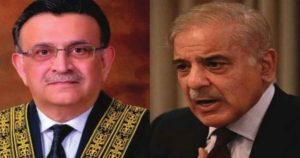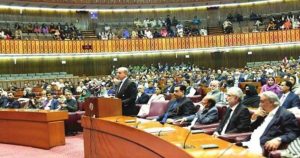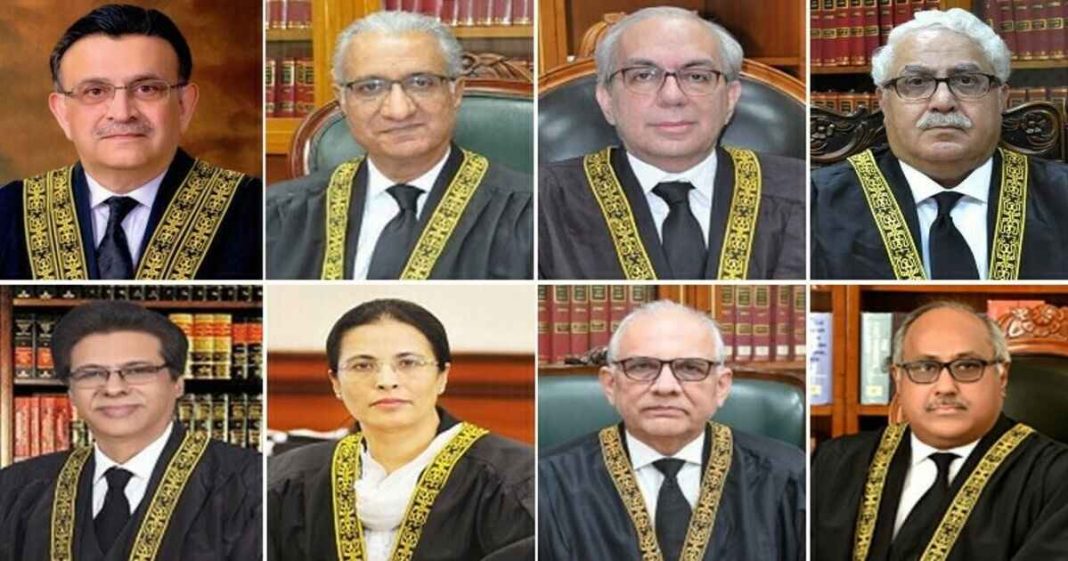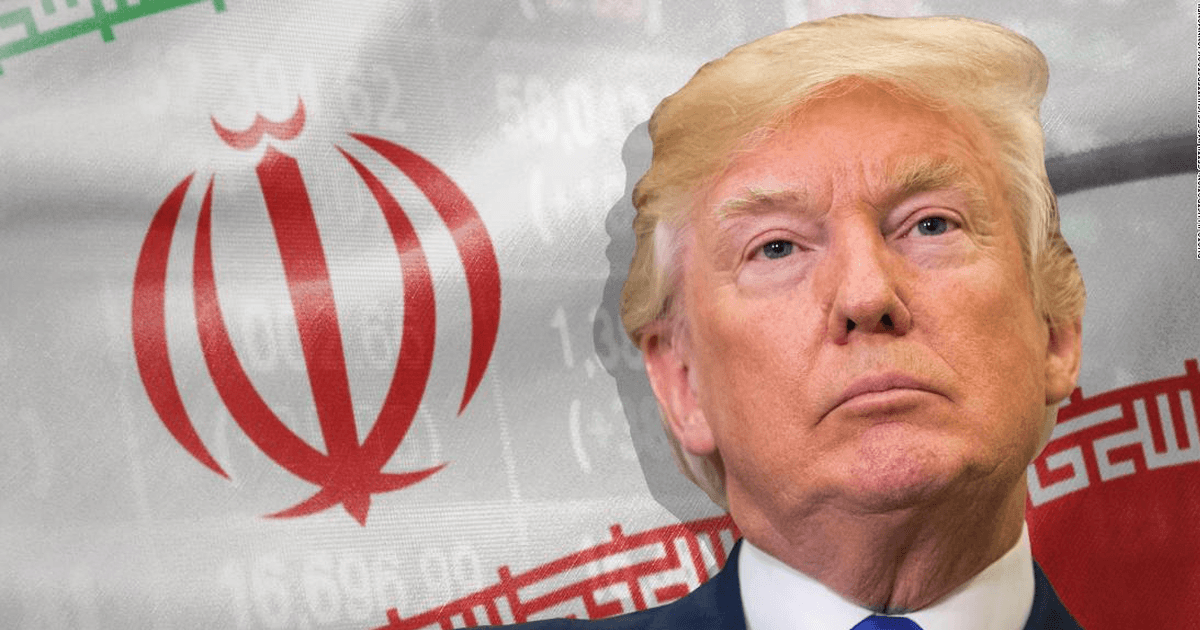Nestled in the palm of the Margallas, Islamabad seems like a city of peace and tranquility. However, a closer look shows that nothing could be further from the truth.
No elections
The right to be governed by chosen representatives is the grundnorm of our constitution. This right is provided in the Preamble and protected through numerous other articles of the Constitution. Treated as an essential feature of the constitution, even parliament cannot make laws that off end or dilute this right. But that is exactly what is being done. People are being denied the right to be governed by their chosen representatives. On the face of it, this is not a political issue. It is a mandatory constitutional obligation cast upon every state institution to ensure that this right is enforced, in letter and spirit.
The matter has taken a more serious dimension. The parliament and executive are now openly contesting the powers and mandate of the Supreme Court [SC]. The reason is that the SC has clearly shown its intent to do what the constitution mandates, i.e., holding the elections of provincial assemblies not later than the mandatory 90 days. This is being labeled, unbelievably so, as a direct assault by the SC on the power centers. The clash of the Titans has started to unfold, and many casualties, some intended, others implied, are expected. The scales of justice hang in the balance. Let us have a look at the battlefront.
Read more: Why PML-N is terrified of elections
Hold elections
It all started when the SC asserted itself much to the surprise and dislike of the government in the matter of elections of the provincial assemblies. The SC, through its order dated 1-03-2023, declared that the people had the inalienable right to choose their representatives and directed the President of Pakistan and Governor of Khyber Pakhtunkhwa to announce the election dates. This direction decimated all permutations of the sitting federal as well as interim governments and came down as a nasty bolt from the blue. Justice was being done, and apparently, for the government, the heavens had started to fall.
The situation demanded a political strategy to thwart the path of justice. It was considered fit to trigger the fault lines within the judiciary.
Count thy judges
A deliberate controversy was attached to the SC judgment ordering the holding of elections within 90 days. This decision was considered a death knell for the ruling party. The word on the street, as well as that of political pundits, suggests that fair and transparent elections will be the end of the political might of many parties in the current government. This eventuality was unacceptable, so the solution providers got together to create as many problems as possible to stop the implementation of this SC ruling.
Mystery of the 4-3 judgment
To arrive at a 4-3 majority judgment, there must have been a seven-member bench, but that was not the case. Let us delve further.
The constitution of benches and the nomination of judges on these benches is the sole prerogative of the CJP. For ease of reference, Order XI of the Supreme Court Rules, 1980 [Rules] is reproduced below:
“Save as otherwise provided by law or by these Rules, every cause, appeal, or matter shall be heard and disposed of by a Bench consisting of not less than three Judges to be nominated by the Chief Justice.”
So, to deliver a judgment, an SC judge must be nominated by the CJP to a bench constituted by the CJP to hear and decide on a particular matter/cause entrusted to this bench.
The CJP first constituted a nine-member bench to hear the election matter. Later, at the request of all nine members, this bench was reconstituted by the CJP, and a new five-member bench was formed. As per SC practice, only this fi ve-member bench constituted by the CJP could hear and decide the election case, and they did so after hearing all the parties. The five-member bench of the SC gave its decision by a majority of 3-2, as stated in the opening paragraph of the order dated 1-3-2023.
Read more: ‘Controversial’ elections may create chaos in country: Rana Sanaullah
Therefore, there is no legal justification to include the judgment of any other judge who was not part of this five-member bench. The nine-member bench did not exist as it was disbanded by the CJP at the request of all nine honorable judges, and judges of the disbanded bench could not exercise any judicial power in the election matter as they were not part of the reconstituted bench of five judges that was hearing this particular case. If any other interpretation is accepted as a precedent, the entire procedural and statutory scheme of the SC shall be disrupted.

Supreme Court (Practice and Procedure) Bill 2023
Under Article 191 of the constitution, the SC has the power to frame rules to regulate its procedure. In the exercise of this power, the SC has framed the Rules. One of the essential powers given to the CJP as the administrative head of the institution of SC is to constitute benches and nominate judges to these benches.
Sensing an opportunity to take advantage of the brewing conflict among some judges of the SC, the parliament passed a law called the Supreme Court (Practice and Procedure) Bill 2023, where the power of the CJP was curtailed in respect of the constitution of benches and the fixing of matters before them. Under the new proposed law, this power was proposed to be vested in a committee of the SC comprising the three most senior judges.
Why is this being done now? To understand this, one must, rather reluctantly and with the utmost respect, refer to certain observations of some SC judges that are coincidentally in sync with the views of the government. The timing of the observations of some judges of the SC that are seen by some quarters as discrediting the CJP is used as the foundation to build an anti-judiciary narrative and further deepen the disagreement among the learned judges.
Read more: Nation demands right to vote from CJP after election postponement
The pivot of this narrative is that the CJP and his group of like-minded judges are biased against the ruling government. This is being done to make the direction of the SC to hold elections within 90 days look suspicious and unenforceable. This judgment is portrayed as a product of institutional partiality. It merits mention that the SC, vide order dated 13-04-2023, has stopped the Supreme Court (Practice and Procedure) Bill 2023 from taking effect.
Supreme Court (Review of Judgments and Orders) Act, 2023
Through this proposed law, a safety valve is being put into place against the judgments of the SC delivered in the exercise of powers under Article 184 (3) of the constitution. Normally, the SC can review its judgments that are given under Article 184 (3) of the constitution. However, the right to appeal against such judgments is not available.
Why is this proposed law being introduced? The parliament had recently passed the aforesaid Supreme Court (Practice and Procedure) Bill 2023 that gave a right of appeal against the orders passed under article 184 (3) of the constitution, the election matter being one of such cases decided under the said provision. However, the operation of this proposed law has been suspended by the SC through its latest order dated 13-04-2023. The parliament, in order to nullify the said orders, has now proposed another law, the Supreme Court (Review of Judgments and Orders) Act, 2023, where the power of review of the SC has been enhanced and brought at par with the right of appeal.
It must be remembered that the remedy of review is quite restrictive in nature when compared with the right of appeal, and review petitions are heard by the same bench that passed the order. Under this new law, this is being changed, and the review powers are being enhanced. Moreover, a fundamental change being proposed is that the review will be heard by a larger bench other than the bench that passed the original order. This proposed law also overrides any previous orders passed by the SC and has a retrospective effect too.
Legislative overruling
One important feature of both the aforementioned bills is their overriding effect on any judgment of the Supreme Court. This aspect has serious implications and invokes the infamous principle of legislative overruling, in which the judgment of a superior court is rendered null by an act of Parliament. This is regarded as a colorable exercise of legislative powers in judicial circles and is deprecated worldwide. Legislative overruling undermines the independence and prestige of the judiciary and is considered intrusive and a transgression into the affairs of the judicature, as provided by the constitution.
My Lordship’s presence in Parliament
It is said that optics shape perceptions and that perceptions are stronger than facts. Amidst all this commotion, the next CJP in waiting thought it wise to enter the gates of Parliament and book a seat with the parliamentarians, share some smiles and shake a few hands. His presence in the house at this juncture raised many eyebrows and unsealed critical lips. Was it necessary to mark his presence in Parliament at this time when the proverbial battlefront is open? Could he have participated virtually? What message was meant to be conveyed by this visit? Was this casual association with the hands that are presently at daggers drawn with the SC a sign of allegiance and defiance at the same time? I will not dare ponder on this any further.

Media narrative
A large part of the media is toeing the government line, understandably so. Advertisements and endorsements are the lifeblood of the media, and what better way to flourish than under the patronage of the current government? Therefore, the mainstream media is targeting the prestige of the institution they would one day need for their own cause, in order to gun for hefty rewards.
It is settled that the government does not want elections. It is also clear that the SC will not back down. At present, there is no way forward unless the conflicting parties agree to take a few steps back. That will not happen as any leniency will be seen as a weakness. All state institutions are now caught up in the imbroglio. Neutrality for the sake of peace is required but not on offer.
Read more: Justice Qazi Faez Isa spotted in parliament
The government is not gaining any political capital. The use of force, abuse of authority, or a colorable exercise of parliamentary privilege will not strengthen the government. With a disastrous performance on all fronts, the government wants to divert the attention of the masses towards the SC, which itself is facing internal challenges. The SC judges decide conflicts among litigants. They must use this expertise in the interest of the institution and settle their differences too.
This duel may keep us glued to the screen, but the reality is that the bond that public representatives in power today had with the people is losing its grip. This slide is certain and unstoppable. Delaying elections will only make the process faster and the consequences more severe.
Faisal Zaman is a corporate legal consultant, political commentator, and author. He writes on legal, social, and political issues. He can be contacted at fzamanadv@gmail.com.














